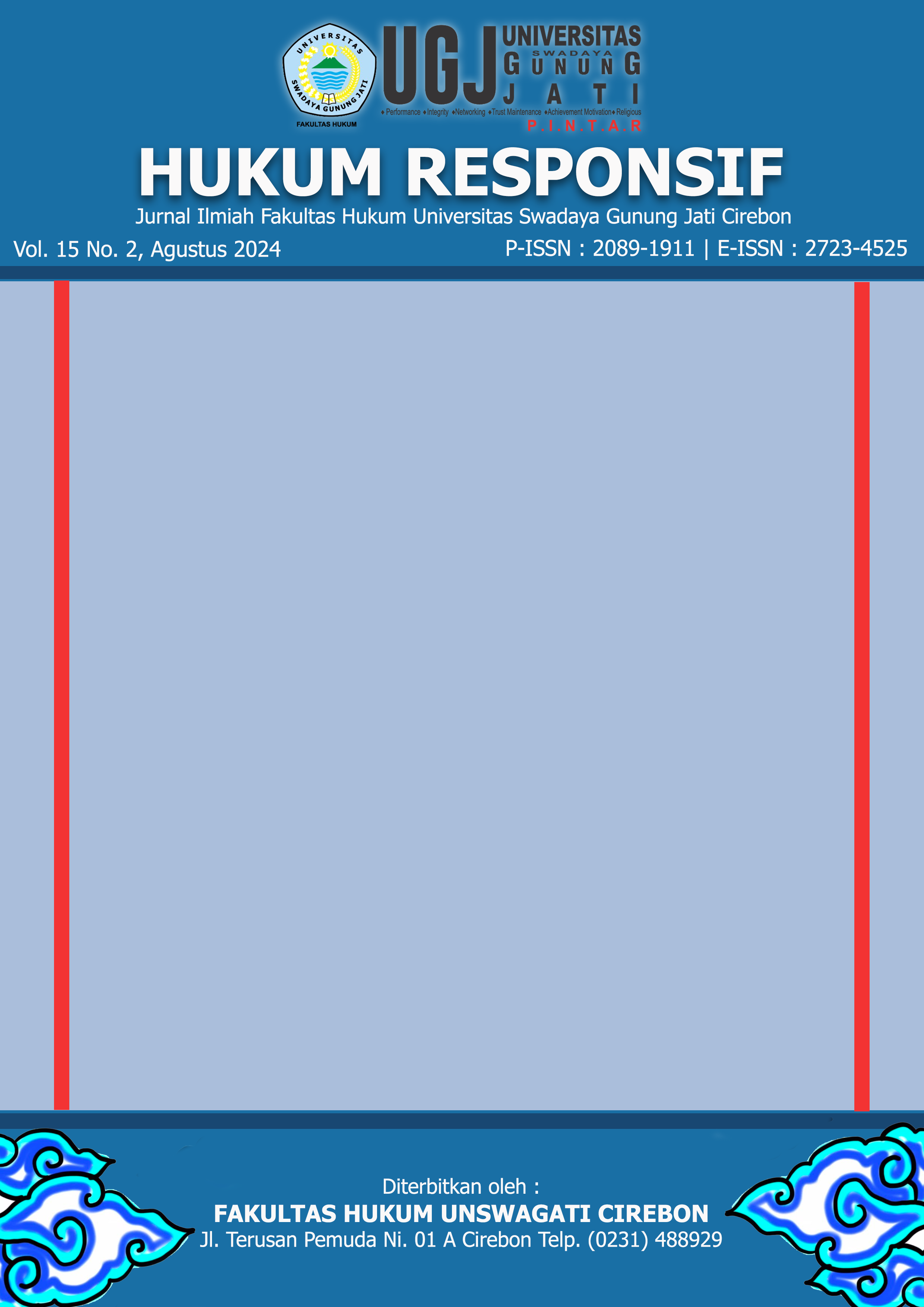LEGAL PROTECTION FOR HOME WORKERS IN PACKING THE POCI PRODUCTS
DOI:
https://doi.org/10.33603/responsif.v15i2.9475Keywords:
Legal Protection, Legal Relationship, Home WorkersAbstract
Abstract
The development of the industrialized world and business mechanisms are becoming more efficient, many people
can now use labor in a more flexible way to
avoid additional costs or fees. This research aims to analyze
the legal relationship between the employer and the homeworker and analyze the legal protection of the fulfillment of the rights of homeworkers in the packing of teabags in the village.
legal protection over the fulfillment of the rights of homeworkers in the packing of teapots in Kedawung Village, Tegal Regency.
Kedawung Village, Tegal Regency. The method used in this research is juridical and empirical.
empirical, Soerjono Soekanto argues that empirical juridical research is a method that connects legal theory with social reality.
method that connects legal theory with social reality. This research uses secondary data
This research used secondary data with data collection method of observation interview. The first research result
shows that the legal relationship that occurs between employers and home workers is based on an ordinary civil agreement.
homeworkers is based on ordinary civil agreements and is not an employment relationship as in Law No. 13/2003.
homeworkers are workers in a company who carry out production activities outside the company's premises.
workers in a company who carry out production activities outside the company environment at home or at the location of an association.
outside the company's premises at home or at the location of a community gathering with a putting out system.
where they work on some of the stages of production outside the Company and are
are paid based on the unit wage produced and do not receive other rights as formal workers.
as formal workers. The second shows that even though home-based workers
work part of the production stages of the company, but do not get
m
Translated with DeepL.com (free version)
References
Buku
Aly, Bustoro, 2018. Buku Undang-Undang Ketenagakerjaan Republik Idonesia. Edited by Sam. Jakarta: Bumi pamulang-Bambu apus.
Asikin, Zainal, 1994, Dasar-Dasar Hukum Perburuhan. Jakarta: Pt Raja Grafindo Persada.
Astorina, Nikie, Yunita Dewanti, Yuliani Setyaningsih, and Siswi Jayanti, 2018, “Faktor Risiko Bahaya Tempat Kerja Dan Lingkungan Rumah Terhadap Kesehatan Home-Based Worker Di Kota Semarang,” Jurnal Kesehatan Lingkungan Indonesia 17 (1).
Flambonita, Suci, 2020, Hukum Ketenaga Kerjaan. Edited by Tim Mnc Publishing. Media Nusa Creative.
Fred R, DavidStrategic, 2022, Management: A Competitive Advantage Approach, Concepts and Cases.
Kamus Besar Bahasa Indonesia (KBBI), 1999, Perlindungan Hukum, Edisi Kedua, Cet. 1, Balai Pustaka, (Jakarta: ).
Utami, T. R., Amrina, N., & Maimunah, M, 2019, Perlindungan Hukum Bagi Pekerja Rumahan Yang Bekerja Secara Putting Out System Melalui Optimalisasi Peran Badan Usaha Milik Desa, Administrative Law and Governance Journal, 2(2).
Wijayanti Asri, 2009, Hukum Ketenagakerjaan Pasca Reformasi, (Jakarta: Sinar Grafika)
Jurnal
Agusmidah, Agusmidah, 2018, “Hak Ekonomi Perempuan: Pekerja Rumahan Dalam Jangkauan Undang-Undang Ketenagakerjaan,” Talenta Conference Series: Local Wisdom, Social, and Arts (LWSA) 1, no. 1.
Agusmidah, A., Ningsih, S., & Herlinda, E, 2018, Rancangan Peraturan Daerah Bagi Perlindungan Pekerja Rumahan (PR), Formalisasi yang Diragukan. Talenta Conference Series: Local Wisdom, Social, and Arts (LWSA), 1(2).
Danang Sunyoto, 2013, Hak Dan Kweajiban Bagi Pekerja Dan Pengusaha, Yogyakarta: Penerbit Pustaka Yustisia.
Dewi, Intan Fatma, and Fentiny Nugroho, 2020, “Bargaining Power Perempuan Pekerja Rumahan Denganskema Putting-Out System Dalam Pemenuhan Hak Sosialekonomi (Studi Deskriptif Pada Perempuan Pekerjarumahan Pengelem Alas Kaki, Kelurahan Penjaringan),” Jurnal Pembangunan Manusia 1 (2): 2. https://doi.org/10.7454/jpm.v1i2.1011.
Edry, Rizky Putra, and Aisyah Ayu Musyafah, 2019, “Pemenuhan Hak-Hak Pekerja Rumahan Dalam Pola Usaha Kemitraan Antara Perusahaan Dengan Pekerja Rumahan,” Jurnal Pembangunan Hukum Indonesia 1 (2). https://doi.org/10.14710/jphi.v1i2.266-280.
Husen, Abdul, and Abdullah Sulaiman, 2022, “Pemenuhan Hak Penghasilan Pekerja Rumahan Sektor Usaha Alas Kaki Di Muara Baru Jakarta Utara DKI Jakarta,” Journal Of Legal Research 4 (3), https://doi.org/10.15408/jlr.v4i3.21316.
Kunarti, Siti, 2009, “Perjanjian Pemborongan Pekerjaan (Outsourcing),” Jurnal Dinamika Hukum 9 (1).
Muhtadi, Muhtadi, and Bandar Lampung, 2019, Perlindungan Hukum Bagi Pekerja Rumah, Edited by Maimunah Tri Rahayu Utami, Naila Amrina and Penerbit, Fiat Justisia, Semarang: Pustaka Magister Semarang.
Nugroho, B, (2020). Perlindungan Hukum Pekerja Rumahan dalam Konteks Hukum Perusahaan di Indonesia. Jurnal Hukum dan Sosial, 12(1),
Ramadhanty, Dhea Rizky, 2020, “Hubungan Kerja Antara Pekerja Rumahan Dengan Perantara (Pengepul) Pada Industri Bulu Mata Palsu Di Desa Gembong Purbalingga,” Universitas Muhammadiyah Purwokweto.
Sugianto, H, (2020), Perlindungan Hukum Tenaga Kerja dalam Sistem Outsourcing di Indonesia. Jurnal Hukum dan Pembangunan, 50(2),
Utami, Tri Rahayu, Naila Amrina, and Maimunah Maimunah, 2019, “Perlindungan Hukum Bagi Pekerja Rumahan Yang Bekerja Secara Putting Out System Melalui Optimalisasi Peran Badan Usaha Milik Desa,” Administrative Law and Governance Journal 2 (2): 365. https://doi.org/10.14710/alj.v2i2.
Zaini Miftach, 2018, “Analisa Peran Ganda Wanita Sebagai Ibu Rumah Tangga Dan Pekerja Pabrik Dalam Meningkatkan Ekonomi Keluarga Perspektif Mqashid Syariah,” Institut Agama Islam Negeri Kudus Fakultas Ekonomi Dan Bisnis Islam.
Sumber Lainnya
Lim, Debby. “Apa Itu Pekerja Lepas Serta Aturannya Di Indonesia.” EA Lience. Last modified 2023, Akses 20 Junni 2024, https://www.recruitfirst.co.id/id/blog/pekerja-lepas-adalah/.
Downloads
Published
Issue
Section
License
Copyright (c) 2024 Siti Duwi Lestari, Susilo Wardani

This work is licensed under a Creative Commons Attribution-ShareAlike 4.0 International License.
The Authors submitting a manuscript do so on the understanding that if accepted for publication, copyright of the article shall be assigned to Jurnal HUKUM RESPONSIF, Fakultas Hukum Universitas Swadaya Gunung Jati. Universitas Swadaya Gunung Jati as publisher of the journal. Copyright encompasses rights to reproduce and deliver the article in all form and media, including reprints, photographs, microfilms, and any other similar reproductions, as well as translations.
Jurnal HUKUM RESPONSIF, Universitas Swadaya Gunung Jati and the Editors make every effort to ensure that no wrong or misleading data, opinions or statements be published in the journal. In any way, the contents of the articles and advertisements published in Jurnal HUKUM RESPONSIF the sole responsibility of their respective authors and advertisers.














